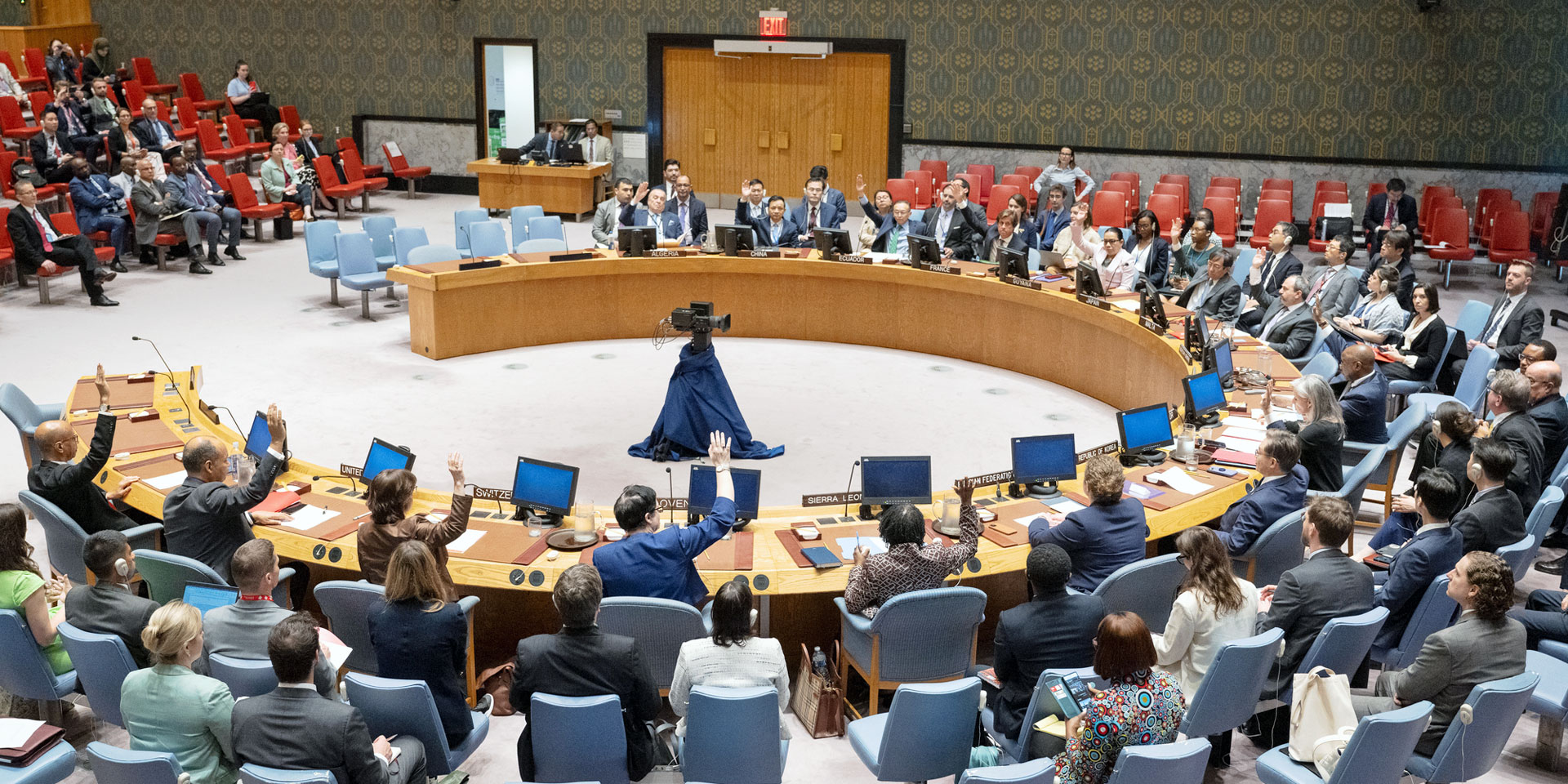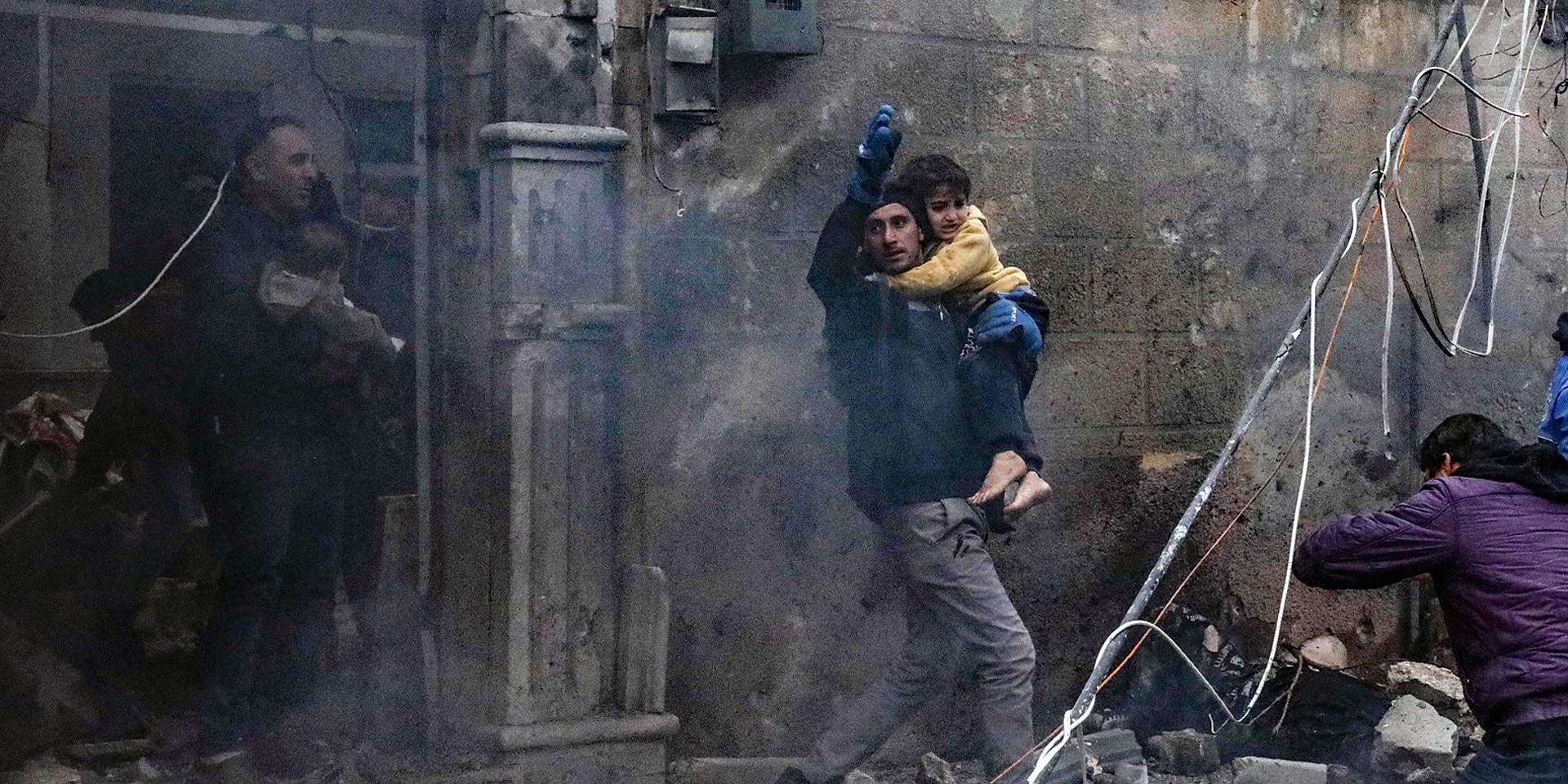"The Geneva Conventions are living instruments"
The Geneva Conventions, the cornerstone of international humanitarian law, were adopted on 12 August 1949. Seventy-five years on, how does Switzerland assess these universally ratified treaties? In the following interview, Franz Perrez, director of the Directorate of International Law (DIL) at the FDFA, takes stock of the situation and explains Switzerland's efforts to implement and promote compliance with the Conventions.
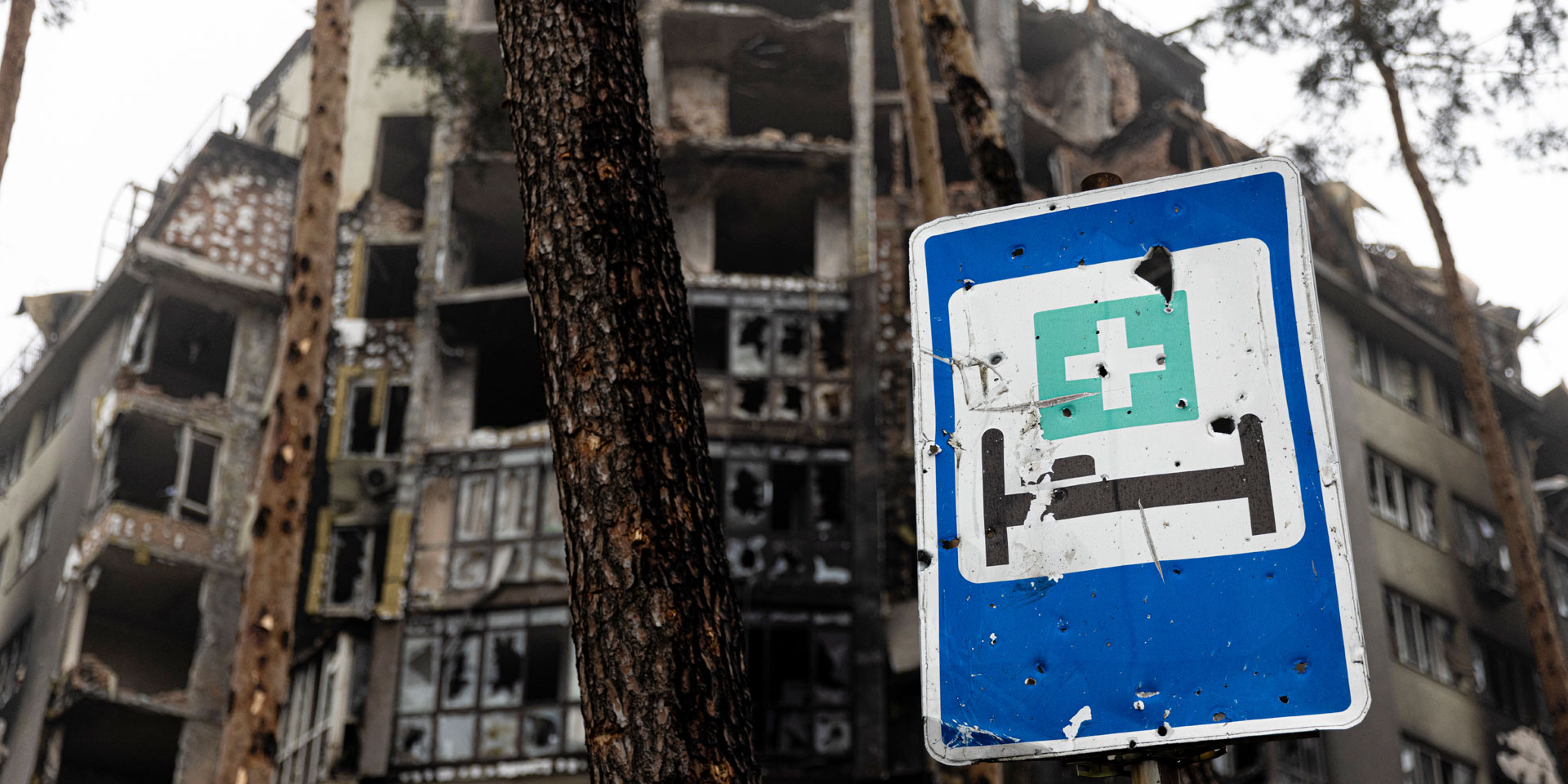
The aim of the Geneva Conventions is to set limits on war in order to protect its victims. © ICRC
Seated at his desk in the north wing of the Federal Palace, Franz Perrez gets straight to the point. The 75th anniversary of the Geneva Conventions, which aim to set limits on warfare to protect its victims, marks a significant milestone in the history of international humanitarian law (IHL). It's an opportunity to take stock, but also to look to the future. Perrez expresses respect and admiration for what was achieved in 1949, while maintaining realism and pragmatism in the face of current challenges.
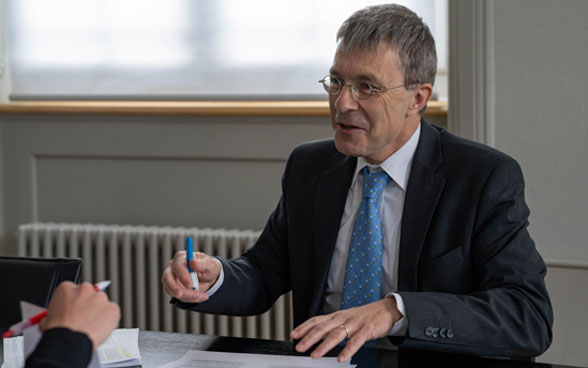
75 years after their adoption, how does Switzerland assess the Geneva Conventions, the heart of IHL?
The commemoration of the Geneva Conventions' adoption occurs against a backdrop of complex and tense global politics. Over a hundred armed conflicts are currently raging worldwide, causing unimaginable human suffering and leading to a proliferation of humanitarian crises. Given this situation, the Geneva Conventions are more relevant than ever. They represent the strongest universal agreement on the need to preserve our shared humanity during wartime. They remain relevant, useful and essential. There is no more effective way to protect the victims of armed conflict.
However, violations of IHL in armed conflicts worldwide are far too frequent, with unacceptable humanitarian consequences. Disturbing reports and images reach us from conflict zones around the world. This reality cannot be ignored. But the focus is often on what doesn't work, which can give the impression that IHL rules are being completely disregarded. In fact, the Geneva Conventions are respected in many cases, though this often goes unnoticed. The Geneva Conventions are respected when a convoy crosses front lines after negotiations, medical supplies are delivered, or the ICRC is informed about a person taken prisoner in a conflict situation. It may seem trivial, but it makes all the difference.
What are the major challenges facing the Geneva Conventions?
The greatest challenge for the Geneva Conventions and IHL in general is ensuring their respect and implementation. Violations of IHL are not, however, a sign of these legal rules' ineffectiveness, but reflect the actions of parties to conflicts.
Respect for the conventions is hindered by certain misunderstandings and misconceptions. Many believe that complying with IHL is solely in the interest of the opposing party. This reasoning is flawed and reflects short-term thinking. When a war ends and IHL has been respected, a return to peace can be easier. It is in everyone’s interest for IHL to be respected, and, I would say, especially so for the parties respecting it. Some also believe that respect for IHL is conditional, meaning that it should only be followed if the other party does so. This is false. IHL must be respected even if the adversary does not.
Another challenge is the disproportionate expectations placed on the conventions by those under threat. While understandable given their difficult situations, a prisoner of war or hostage cannot be released overnight. Similarly, the ICRC cannot act against the wishes of an authority in a given territory, nor can it reveal all the information it has if it is to obtain access to prisoners.
What can be done to address these challenges?
Anticipation, training and prevention are essential. States must actively foster a culture of respect for IHL, which currently encompasses about a hundred treaties stemming from the impetus provided by the Geneva Conventions. This cultivation of respect should occur not only during wartime but also in times of peace and escalating tensions. I believe that promoting adherence to IHL well before the outbreak of conflict helps establish a culture that expects the rules to be rigorously observed from the moment hostilities begin, should they occur.
Switzerland is active in the fields of prevention and training. But that's not all. Can you provide concrete examples of Switzerland's efforts to implement and promote respect for the Geneva Conventions?
Switzerland's support for the Geneva Conventions operates on two levels: firstly, ensuring proper implementation domestically, and secondly, supporting implementation and compliance internationally.
A concrete example at national level is the establishment of the Interdepartmental Committee for International Humanitarian Law (ICIHL) by the Federal Council in 2009. This committee is responsible for coordinating IHL issues and activities within Switzerland and ensures the coherent implementation of Switzerland's IHL obligations. Swiss soldiers receive IHL training when they are deployed and the Swiss Armed Forces have legal advisers with in-depth IHL training at various levels, including brigade, division, special forces units and army staff.
And at international level?
Switzerland has made respecting, promoting, and implementing IHL a consistent element of its foreign policy. We support the observance and implementation of IHL, for example, through the work of the SDC, which is part of the FDFA, and more specifically through the Swiss Humanitarian Aid Unit. The latter is the operational arm of Switzerland's implementation of the Geneva Conventions. This year, Switzerland is involved in 20 contexts affected by armed conflict where IHL is applicable.
Exchanging experiences, particularly on the challenges of implementing IHL, is also essential. The Geneva Conventions are living instruments of IHL. Within this framework, Switzerland organises meetings of government experts on specific IHL issues. We invite all countries to participate in these meetings, and have organised two already. The first was in 2020, on the protection of medical activities in armed conflicts, and the second last year, in collaboration with the ICRC, on environmental protection in armed conflicts. This latest meeting brought together 380 experts from over 120 countries. Another essential platform for exchanges on the Geneva Conventions is the International Conference of the Red Cross and Red Crescent, the 34th edition of which will take place in October 2024 in Geneva.
Does Switzerland also promote the observance of the Geneva Conventions and IHL in its role as a member of the UN Security Council?
Indeed, the protection of civilians in armed conflicts is one of Switzerland's four priorities for its 2023–24 term on the UN Security Council. In May 2024, the Security Council adopted a resolution drafted by Switzerland on the protection of humanitarian and UN personnel in conflict zones. Switzerland is particularly committed to ensuring respect for IHL obligations concerning humanitarian access, in order to safeguard humanitarian activities. It has also advocated for the implementation of humanitarian exemptions to UN sanctions regimes. Switzerland has emphasised the connection between IHL violations and food insecurity, and raised concerns about protecting essential infrastructure and access to water.
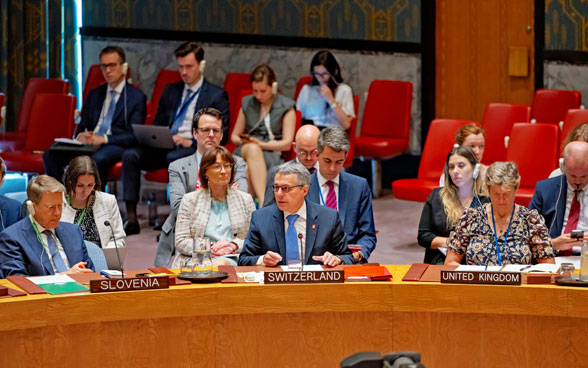
Furthermore, we are currently observing a tendency to relativise international law – particularly IHL – in Security Council resolutions and other outputs. Consequently, we are actively engaged in negotiations to ensure that various Security Council products, especially resolutions, are compatible with IHL in both substance and wording. This is a crucial task, and Switzerland is one of the few countries undertaking it. I recently received positive feedback on these efforts from Swiss IHL specialists, who noted significant improvements between initial and final versions of documents.
Switzerland also supports the ICRC...
The ICRC is the Confederation's main partner in humanitarian aid. If, 75 years after their adoption, the Geneva Conventions continue to save lives, it is largely thanks to the courageous actions of humanitarian organisations, including the ICRC. The latter has been mandated by the international community, under the Geneva Conventions, to ensure that IHL is fully applied.
As a neutral, independent and impartial actor, the ICRC's role is of paramount importance. The ICRC intervenes in emergency situations and also works to promote respect for IHL and its incorporation into national legislation. For example, states have given it a very specific role regarding visits to detainees. It is the responsibility of the international community to ensure that the ICRC can fulfil its mandate.
At its meeting on 26 June 2024, the Federal Council decided to grant an ordinary contribution of CHF 56 million to the ICRC for its operations in crisis countries in 2024.
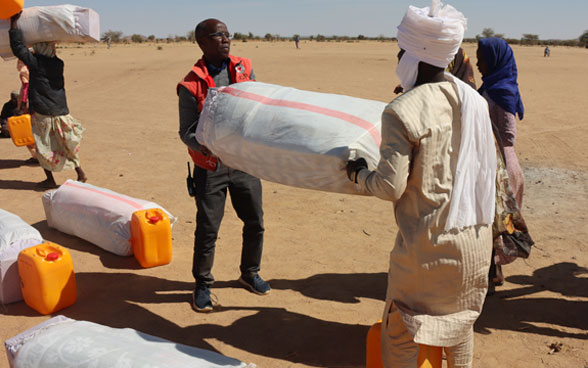
What appeal is Switzerland making on the occasion of the 75th anniversary of the Geneva Conventions?
At this critical juncture, Switzerland is calling for respect for IHL to be elevated to a political priority. All states are urged to reaffirm their dedication to upholding the Geneva Conventions. Nations are called upon to leverage their influence to prevent and halt violations of IHL. Switzerland advocates for concrete measures to be implemented domestically, including: ratification of the Additional Protocols to the Geneva Conventions; adoption of legislation to implement IHL at national level; and dissemination of IHL rules among armed forces and the civilian population.

